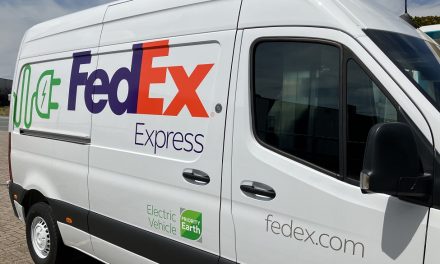
Royal Mail feeling pressure from rivals as profits rise 6.7%
Royal Mail boss Moya Greene said today that her company has been facing “headwinds” that have hampered growth as the company entered the private sector. The UK’s universal service provider revealed its first annual results as a private company today, showing revenue edging up 2% year-on-year to £9.46bn and operating profits after transformation costs up 6.7% to £430m, as parcel growth, driven by e-commerce, more than countered letter business declines.
Subject to July’s shareholder meeting, Royal Mail will pay out a dividend as previously indicated, at 13.3p per share.
CEO Greene said her company was facing “intense” competition in both the parcels sector, and increasingly in the letters sector.
Parcel volumes were flat compared to last year, although parcel revenues grew 7% thanks to pricing increases. It meant that for the first time parcels brought in more than half of Group revenue (51%).
Addressed letter volumes dropped 4% year-on-year, with letter revenue down 2%.
Commenting on the annual results for the 12 months up to the end of March, Greene said the performance was in line with expectations.
“We are facing a couple of headwinds,” she said.
“The competitive environment on the parcels side is more intense. We are taking steps to remain the leader in this growing market. On the letters side, the headwind is direct delivery and we have strategies in place to counter its adverse financial impact.”
Royal Mail’s UK-based business, UK Parcels, International & Letters, saw its revenues up 2% in the financial year, to £7.79bn, with operating profit at £309m after transformation costs.
The Group’s European express parcels business, GLS, saw its revenues rise 7% year-on-year to £1.65bn with its volumes up 6% year-on-year. Operating profit was £108m. GLS achieved 3% revenue growth in its largest market, Germany, and cut its operating losses in France by EUR 3m to EUR 37m as a turnaround programme continued.
UK parcel volumes “as expected” were flat compared to the previous year, at 1.07bn items. The 4% drop in addressed letter volumes was “at the better end” of forecasts, the company said.
Express parcels unit Parcelforce Worldwide saw its revenues rise 8% year-on-year to £77m.
Competition concern
Royal Mail is demanding action from postal regulator Ofcom to protect its universal letter service from the competition of rivals TNT Post UK. TNT, which is owned by Dutch postal operator PostNL, has been expanding its end-to-end mail delivery service since April 2012, and now offers delivery in Liverpool, Manchester and much of London.
Royal Mail said today that without help from the regulator, it believes competition from its rival could cost it £200m by 2017-18 as it expands to cover 42% of UK addresses by 2017.
The company said that since Ofcom has forced a suspension of Downstream Access price increases, pending an inquiry prompted by complaints from TNT Post, and since TNT is mounting the first significant competitive challenge to Royal Mail’s last mile letter monopoly, there was a “reasonable prospect” that the regulator’s indicative requirement for a pre-tax profit margin of between 5% and 10% “may never sustainably be achieved”.
The firm is putting together an official demand for Ofcom to take action now, and carry out a full review of TNT Post’s end-to-end mail delivery service.
Greene said: “TNT Post UK can cherry-pick easy-to-serve urban areas; delivering easy-to-handle post to homes less frequently than Royal Mail and to no defined quality standard. Royal Mail is required to deliver six-days-a-week, overnight, throughout the whole country, to stringent quality standards and at a uniform, affordable tariff. Moreover, we are also required to deliver any items TNT Post UK does not consider economic to deliver itself. If TNT Post UK is successful in delivering its stated objectives, this could threaten the fundamental economics of the Universal Service.”
Royal Mail has also been facing “intense” competition in the parcels industry, but Greene said today that while e-commerce is driving growth in the Group’s parcels business, it is not yet operating in all online retail segments and is “under-represented” in areas like clothing and shoes.
The Royal Mail boss admitted that declines in consumer parcel volumes following the company’s price increases in April 2013 had been “greater than expected”, which had prompted revisions to small parcel size limits.
But, she said new service additions including Sunday deliveries and tracked returns, along with the Local Collect click and collect service run with the Post Office, will help drive parcels growth.












